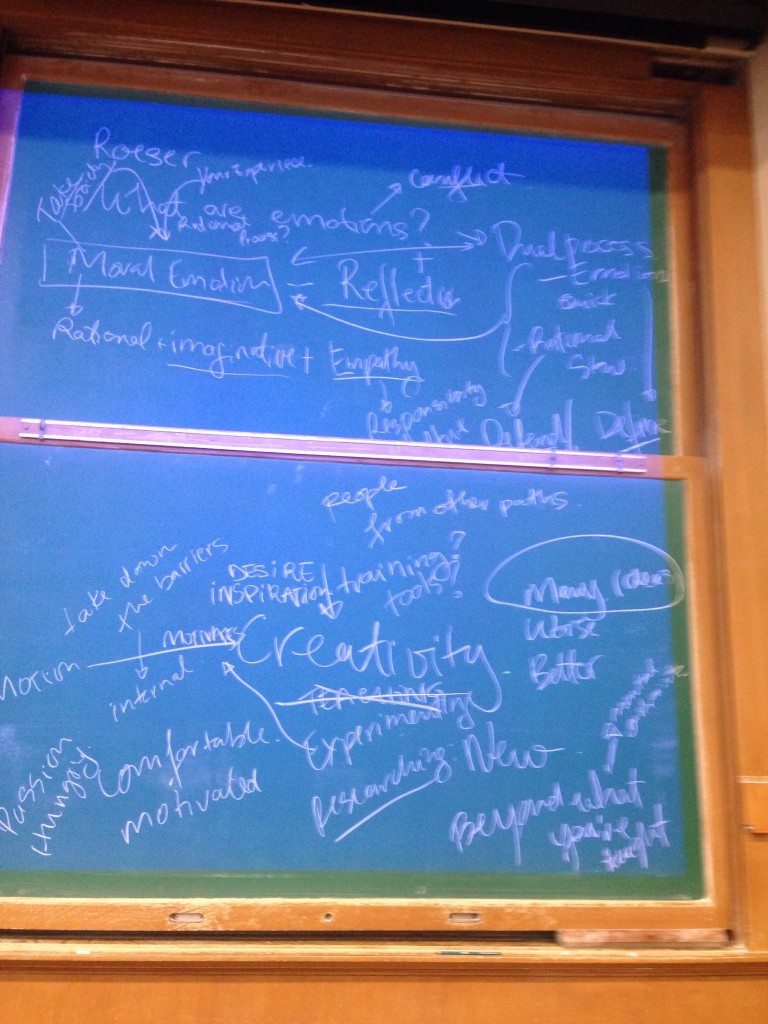Here are the questions that we discussed in class today:
- How does Roeser define “emotion?” (Dual process theory states that thought is composed of “emotions,” which are rapid reactions, and “rational evaluation,” which is a slower process. Roeser proposes that there are also more elaborate type of emotions that are reflective, or are part of the reflection process. She also proposes that these emotions enable us to imagine future scenarios, which is an important element of risk analysis – remember the risk triplet – and moral decision making)
- What is “moral emotion?”
- How does one define “emotional maturity?” Why is it important for engineering professionals? Does your engineering education at Berkley help train your emotional maturity? (When I’ve applied for jobs in the past, and when I’ve been a reference writer for students applying for research positions, I’ve come across evaluation forms that ask reviewers to judge the “emotional maturity” of the applicant. If in your careers you are evaluated on this criterion, then it’s important to ask if your education helps you train this dimension of your skills).
- What is creativity? What role does emotion play in creativity? How do you train creativity?
Below is a photograph of the blackboard notes.
Here are some follow-up questions that I would like to raise:
- Could emotions be engaged to inform morally-sensitive design?
- Can emotions be a source of critical reflection? Do they lead to more balanced judgements? Can they help in approaching complex ethical questions?
- Narrative vs. computational intelligence – what do these terms mean? Do emotions help us better draw context-sensitive insights?
- How do you define “emotional intelligence?” How does Roeser define it? What has helped you develop your “emotional intelligence?”
- Can you make a list of emotions? Which one of these have you encountered in your work as an engineering student?
And here are some of my responses to today’s class discussion that I didn’t get to say in class (disclaimer: these are personal opinions, but of course all opinions are personal):
- I don’t think that creativity is something that cannot be trained. I don’t think that people have to be born creative in order to be creative. Everybody has different inclinations, and everybody trains their creativity differently. To train it, it’s certainty necessary to be comfortable to try things that may or may not go somewhere; but at the same time there’s also a degree of discomfort that comes with the creative process – because you’re breaking the bounds of previously reasoned thought, and that can be uncomfortable – and you have to learn how to approach that zone of discomfort, and how to work in it.
- There was a lot of discussion about emotions that arise from conflict – because engineers need to know how to work in teams, and poorly managed emotions get in the way of productive team work. First of all, I want to emphasize that repressed or dismissed emotions are NOT the solution to good team-work. It’s not only the responsibility of the person having strong emotions to analyze them and better express them so that everybody else understands their source, but it’s also the responsibility of everybody else to help that person do exactly that. When somebody is infuriated, that infuriates people around her/him and maybe that was exactly the intended impact, to get people mobilized to do something about the issue at hand. Think about the Bhopal accident – how can you tell that story without emotion? Now, sometimes it’s not the intention of that one person to infuriate everybody – but there is something at the root cause of that person’s anger, and that needs to be teased out – and that teasing out is a process is not a strictly self-reflective exercise – it actually should involve the team as much as it involves the infuriated person. Somebody gave the example of Steve Wozniak being very difficult to work with because he didn’t keep his emotions at bay – well, he did get a lot of great things done, didn’t he? Perhaps it was his way of pushing people to do things better? All of that is the preamble to a bigger point that I wanted to make: emotional maturity does not mean being a master of suppressing your feelings, a master of continuing to be productive despite your feelings or your emotional state, a master of keeping your emotions at bay. Emotional maturity, or emotional intelligence means knowing how to work WITH your feelings, understanding them, soliciting them, working with them, teasing them out, using them to complement conscious thought.
[Another brief post to follow, on the instructions for the exercise at the art museum.]

